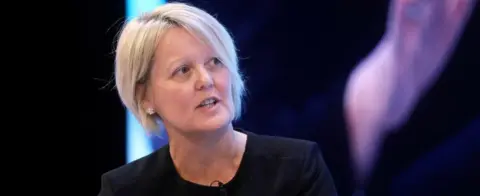RBS Group to change its name to NatWest
Royal Bank of Scotland (RBS) Group has said it plans to change its name later this year, as it reported a near doubling of annual profits.
The Edinburgh-based bank, which owns RBS, NatWest and Ulster Bank, said it would rename itself as NatWest Group.
The bank reported profits of £3.1bn for 2019, nearly double the £1.6bn seen the year before.
New RBS chief executive Alison Rose called the results the "start of a new era" for the bank.
It is thought that Ms Rose is hoping a rebrand will help shift the lender's image away from its association with the financial crisis.
The bank was rescued by the government in 2008 in the aftermath of the financial crisis at a cost of £45bn and it is still 62% state-owned.
Ms Rose told the BBC's Today programme that the name change would not alter any services for RBS or NatWest customers.
About 80% of the bank's customers are thought to use NatWest. Names of individual NatWest and RBS branches will remain the same.
She also said that the name change would not result in any job cuts across the group.
This is Ms Rose's first set of results for the lender. She became the first woman to lead one of the so-called big four largest UK banks when she was appointed last year.

Crucial questions unanswered

Today's announcement was not just the first set of full-year results unveiled by new chief executive Alison Rose but also the long-awaited unveiling of her strategy.
But many crucial questions remain unanswered, with Ms Rose failing to address recent press reports that claimed job cuts may be in store.
RBS was the subject of a £45bn state bailout during the financial crisis, and remains 62% taxpayer-owned. A 25-year veteran of the bank, Alison Rose is one of the few senior executives left from the pre-crisis era, when former boss Fred Goodwin's overambitious expansion plans left the bank in a perilous state.
More than a decade on, it falls to her to complete the clean-up operation. She says the name change for the parent company marks a new era, but the real challenge is to prove she can get the bank back into a state where the remaining stake can be sold without incurring a hefty loss for taxpayers.

Climate commitment
RBS also announced it was committed to "at least halve the climate impact" of its financing activity by 2030.
It says it will stop lending to coal companies by the end of the decade.
The bank also confirmed it would make its own operations "net carbon zero" by the end of this year.
That follows on from a pledge by Lloyds Banking Group to halve the amount of carbon emissions it finances through personal and business loans by 2030.

A continuity candidate
 Reuters
ReutersMs Rose has been at RBS for more than 25 years, mainly in a number of roles in its investment bank.
She was previously deputy chief executive of NatWest Holdings, and before Ms Rose was appointed chief executive of the RBS group she was head of commercial and private banking.
She worked her way up after joining the bank as a graduate trainee in 1992.
Unlike her predecessor Ross McEwan, she is based solely in London, although the bank has its headquarters in Edinburgh.
Ms Rose is also paid more than her predecessor, with her annual salary set at £1.1m compared with Mr McEwan's £1m.

Shares hit
RBS's share price fell by more than 6% in Friday trading after its results came out.
Neil Wilson, chief market analyst at Markets.com, said markets needed "some convincing", despite the jump in profits.
But he said "it's clear RBS is putting legacy conduct issues behind it and has got the payment protection insurance (PPI) monkey off its back".
The bank took a £900m charge for mis-sold PPI in 2019, which was at the top end of its expectations.
Mr Wilson added: "Now that the PPI deadline has passed, the bank has much greater visibility of future cash generation."